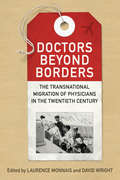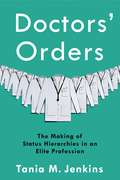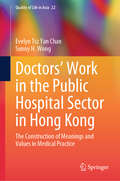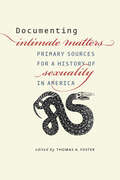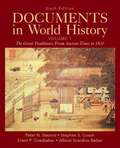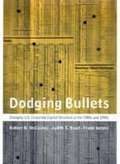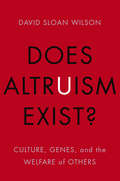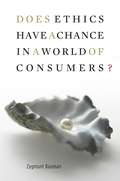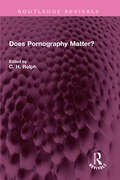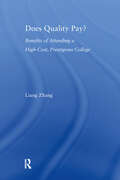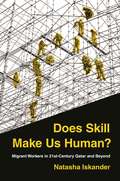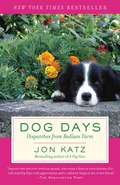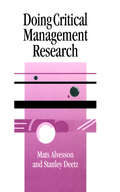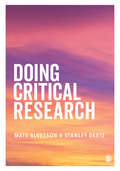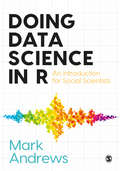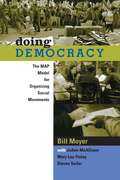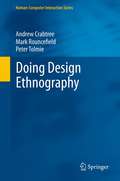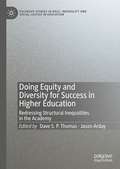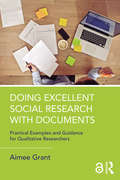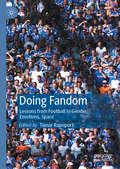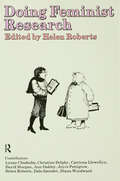- Table View
- List View
Doctors beyond Borders: The Transnational Migration of Physicians in the Twentieth Century
by David Wright Laurence MonnaisThe transnational migration of health care practitioners has become a critical issue in global health policy and ethics. Doctors beyond Borders provides an essential historical perspective on this international issue, showing how foreign-trained doctors have challenged - and transformed - health policy and medical practice in countries around the world.Drawing on a wide variety of sources, from immigration records and medical directories to oral histories, the contributors study topics ranging from the influence of South Asian doctors on geriatric medicine in the United Kingdom to the Swedish reaction to the arrival of Jewish physicians fleeing Nazi Germany and the impact of the Vietnam War on the migration of doctors to Canada. Combining social history, the history of health and medicine, and immigration history, Doctors beyond Borders is an impressive selection of essays on a topic that continues to have global relevance.
Doctors' Orders: The Making of Status Hierarchies in an Elite Profession
by Tania M. JenkinsThe United States does not have enough doctors. Every year since the 1950s, internationally trained and osteopathic medical graduates have been needed to fill residency positions because there are too few American-trained MDs. However, these international and osteopathic graduates have to significantly outperform their American MD counterparts to have the same likelihood of getting a residency position. And when they do, they often end up in lower-prestige training programs, while American-trained MDs tend to occupy elite training positions. Some programs are even fully segregated, accepting exclusively U.S. medical graduates or non-U.S. medical graduates, depending on the program’s prestige. How do international and osteopathic medical graduates end up so marginalized, and what allows U.S.-trained MDs to remain elite?Doctors’ Orders offers a groundbreaking examination of the construction and consequences of status distinctions between physicians before, during, and after residency training. Tania M. Jenkins spent years observing and interviewing American, international, and osteopathic medical residents in two hospitals to reveal the unspoken mechanisms that are taken for granted and that lead to hierarchies among supposed equals. She finds that the United States does not need formal policies to prioritize American-trained MDs. By relying on a system of informal beliefs and practices that equate status with merit and eclipse structural disadvantages, the profession convinces international and osteopathic graduates to participate in a system that subordinates them to American-trained MDs. Offering a rare ethnographic look at the inner workings of an elite profession, Doctors’ Orders sheds new light on the formation of informal status hierarchies and their significance for both doctors and patients.
Doctors’ Work in the Public Hospital Sector in Hong Kong: The Construction of Meanings and Values in Medical Practice (Quality of Life in Asia #22)
by Evelyn Tsz Chan Sunny H. WongThis book explores how public hospital sector doctors in Hong Kong understand their work and careers. Using narrative interviews with 27 medical doctors, the book examines how their personal values provide motivation and meaning for their work. How do they cope with the various hardships and crises they face in public hospitals? How can other doctors navigate similar issues in their own work? What should medical students know about the reality of medical work, as they stand poised to start their own career journeys? What should medical administrators know about work at the coal-face as they seek to tackle the problems the sector faces? This book offers a rare, personal window into doctors&’ views on their own work. The book also provides a useful resource for students and scholars in the fields of medical humanities, public health, the sociology of work, and narrative research.
Documenting Intimate Matters: Primary Sources for a History of Sexuality in America
by Thomas A. Foster“Thorough, and timely . . . sure to be a popular and valued companion to courses on the history of sexuality and gender in the United States.” —Regina Kunzel, University of MinnesotaOver time, sexuality in America has changed dramatically. Frequently redefined and often subject to different systems of regulation, it has been used as a means of control; it has been a way to understand ourselves and others; and it has been at the center of fierce political storms, including some of the most crucial changes in civil rights in recent years. Edited by Thomas A. Foster, Documenting Intimate Matters features seventy-two documents that collectively highlight the broad diversity inherent in the history of American sexuality.Complementing the third edition of Intimate Matters, by John D’Emilio and Estelle B. Freedman—often hailed as the definitive survey of sexual history in America—the multiple narratives presented by these documents reveal the complexity of this subject in US history. The historical moments captured in this volume show that, contrary to popular misconception, the history of sexuality is not a simple story of increased freedoms and sexual liberation, but an ongoing struggle between change and continuity.
Documents In World History: Volume 1
by Peter N. Stearns Stephen S. Gosch Erwin P. Grieshaber Allison Scardino BelzerThis book is a thematically organized, authoritative collection of original sources that highlight political, social, cultural and economic issues in world history. The text also provides documents on the hot topics of gender and cultural history. Revised and updated with over a quarter of the documents new, the sixth edition retains its global emphasis. Standard selections and political coverage have been improved, and attention to Islam and Christianity as well as South Asia have been expanded.
Dodging Bullets: Changing U. S. Corporate Capital Structure in the 1980s and 1990s
by Robert N. Mccauley Judith S. Ruud Frank IaconoThe late 1980s saw a huge wave of corporate leveraging. The U. S. financial landscape was dominated by a series of high-stakes leveraged buyouts as firms replaced their equity with new fixed debt obligations. Cash-financed acquisitions and defensive share repurchases also decapitalized corporations. This trend culminated in the sensational debt-financed bidding for RJR-Nabisco, the largest leveraged buyout of all time, before dramatically reversing itself in the early 1990s with a rapid return to equity. This entertaining summary of the broad reshaping of U. S. corporate finance in the last decade and a half looks at three major issues: why corporations leveraged up in the first place, why and how the leverage wave came to an end, and what policy lessons are to be drawn. Using the Minsky-Kindleberger model as a framework, the authors interpret the rise and fall of leveraging as a financial market mania. In the course of chronicling the return to equity in the 1990s, they address a number of important corporate finance questions: How important was the return to equity in relieving corporations' debt burdens? How did the return to equity affect the ability of young high-tech firms to finance themselves without selling out to foreign firms?
Does Altruism Exist?
by David Sloan WilsonDavid Sloan Wilson, one of the world’s leading evolutionists, addresses a question that has puzzled philosophers, psychologists, and evolutionary biologists for centuries: Does altruism exist naturally among the Earth’s creatures? The key to understanding the existence of altruism, Wilson argues, is by understanding the role it plays in the social organization of groups. Groups that function like organisms indubitably exist, and organisms evolved from groups. Evolutionists largely agree on how functionally organized groups evolve, ending decades of controversy, but the resolution casts altruism in a new light: altruism exists but shouldn’t necessarily occupy center stage in our understanding of social behavior. After laying a general theoretical foundation, Wilson surveys altruism and group-level functional organization in our own species—in religion, in economics, and in the rest of everyday life. He shows that altruism is not categorically good and can have pathological consequences. Finally, he shows how a social theory that goes beyond altruism by focusing on group function can help to improve the human condition in a practical sense. Does Altruism Exist? puts old controversies to rest and will become the center of debate for decades to come.
Does Ethics Have a Chance in a World of Consumers? (Institute for Human Sciences Vienna Lecture Series)
by Zygmunt BaumanZygmunt Bauman is one of the most admired social thinkers of our time. Once a Marxist sociologist, he has surrendered the narrowness of both Marxism and sociology, and dares to write in language that ordinary people can understand—about problems they feel ill equipped to solve. This book is no dry treatise but is instead what Bauman calls “a report from a battlefield,” part of the struggle to find new and adequate ways of thinking about the world in which we live. Rather than searching for solutions to what are perhaps the insoluble problems of the modern world, Bauman proposes that we reframe the way we think about these problems. In an era of routine travel, where most people circulate widely, the inherited beliefs that aid our thinking about the world have become an obstacle. Bauman seeks to liberate us from the thinking that renders us hopeless in the face of our own domineering governments and threats from unknown forces abroad. He shows us we can give up belief in a hierarchical arrangement of states and powers. He challenges members of the “knowledge class” to overcome their estrangement from the rest of society. Gracefully, provocatively, Bauman urges us to think in new ways about a newly flexible, newly challenging modern world. As Bauman notes, quoting Vaclav Havel, “hope is not a prognostication.” It is, rather, alongside courage and will, a mundane, common weapon that is too seldom used.
Does Pornography Matter? (Routledge Revivals)
by C. H. RolphFirst published in 1961, Does Pornography Matter? consists of chapters written by seven men who were likely to have different points of view, and who would write with authority from the interest they represented. There was no assumption behind the question, and in fact each author has concluded that in one way or another pornography does matter. It was felt, as a start, that to judge whether this or that book was obscene, or a ‘masterpiece’, was not central to the problem. The purpose of the editor was to ask the right question, which is whether pornography matters. The result is a fascinating analysis and some suggestions towards a complete answer. This book will be of interest to students of sociology, religion and psychology.
Does Quality Pay?: Benefits of Attending a High-Cost, Prestigious College
by Liang ZhangPrevious research has generally shown a very small although statistically significant economic benefit from attending high-quality colleges. This small effect was at odds with what students' college choice and various social theories would seem to suggest. This study sought to reconcile the empirical evidence and theories. The effort was in two directions. First, the economic effect of college quality was expanded from examining only the economic benefit to considering other student outcomes including job satisfaction and graduate degree accomplishment. A new perspective regarding the social role of college quality was offered in conclusion.
Does Skill Make Us Human?: Migrant Workers in 21st-Century Qatar and Beyond
by Natasha IskanderAn in-depth look at Qatar's migrant workers and the place of skill in the language of control and powerSkill—specifically the distinction between the “skilled” and “unskilled”—is generally defined as a measure of ability and training, but Does Skill Make Us Human? shows instead that skill distinctions are used to limit freedom, narrow political rights, and even deny access to imagination and desire. Natasha Iskander takes readers into Qatar’s booming construction industry in the lead-up to the 2022 World Cup, and through her unprecedented look at the experiences of migrant workers, she reveals that skill functions as a marker of social difference powerful enough to structure all aspects of social and economic life.Through unique access to construction sites in Doha, in-depth research, and interviews, Iskander explores how migrants are recruited, trained, and used. Despite their acquisition of advanced technical skills, workers are commonly described as unskilled and disparaged as “unproductive,” “poor quality,” or simply “bodies.” She demonstrates that skill categories adjudicate personhood, creating hierarchies that shape working conditions, labor recruitment, migration policy, the design of urban spaces, and the reach of global industries. Iskander also discusses how skill distinctions define industry responses to global warming, with employers recruiting migrants from climate-damaged places at lower wages and exposing these workers to Qatar’s extreme heat. She considers how the dehumanizing politics of skill might be undone through tactical solidarity and creative practices.With implications for immigrant rights and migrant working conditions throughout the world, Does Skill Make Us Human? examines the factors that justify and amplify inequality.
Does War Make States?
by Kaspersen Lars Bo Jeppe StrandsbjergArising from renewed engagement with Charles Tilly's canonical work on the relationship between war and state formation, this volume situates Tilly's work in a broader theoretical landscape and brings it into contemporary debates on state formation theory. Starting with Tilly's famous dictum 'war made the state, and the state made war', the book takes his claim further, examining it from a philosophical, theoretical and conceptual view, and asking whether it is applicable to non-European regions such as the Middle East, South America and China. The authors question Tilly's narrow view of the causal relationship between warfare and state-making, and use a positive yet critical approach to suggest alternative ways to explain how the state is formed. Readers will gain a comprehensive view of the most recent developments in the literature on state formation, as well as a more nuanced view of Charles Tilly's work.
Dog Days: Dispatches from Bedlam Farm
by Jon KatzIn Dog Days, Jon Katz, the squire of Bedlam Farm, allows us to live our dreams of leaving the city for the country, and shares the unpredictable adventure of farm life.
Doing Christian Ethics From The Margins
by Miguel A. De La TorreA revised and expanded edition of the text that presents a justice-based ethics that avails itself of the perspectives and experiences of those on the margins.
Doing Critical Management Research (SAGE series in Management Research)
by Mats Alvesson Dr Stanley A. Deetz`Alvesson and Deetz rehearse the arguments against neo-positivism and quantitative research very effectively... also make the important distinction between qualitative work in general and critical qualitative work in particular. The arguments here feel fresh and engaged, helped along by numerous illustrations and examples from particular research studies. ...a welcome antidote to the majority of methodology books, especially in a climate where research - especially at doctoral level- is increasingly prone to standardization. The value of the book in this regard cannot be overestimated, because it draws together insights and arguments. ...expect it to be widely read and cited, and to remain the standard text on critical management research practice for a good many years to come. This is an excellent text which combines a very impressive coverage of the literature while showing great care and thought in exposition' - Management Learning Providing a detailed discussion of the practice of doing critical research in organizations, utilizing both qualitative research processes and critical theories of organizations, this textbook will be essential for all those involved in interpreting and researching contemporary institutions and organizations. This volume gives an authoritative and insightful framework for navigating critical theories and methods across the social sciences, but in particular in relation to the study of corporate organizations.
Doing Critical Research (Sage Series In Management Research Ser.)
by Mats Alvesson Stanley DeetzThis title builds on the success of Doing Critical Management Research which has proven to be a seminal text in the 20 years since publication. In 2020, Alvesson and Deetz have broadened their focus and updated the original book to offer relevance to critical research across all of the social sciences. In reflecting contemporary theoretical and methodological turns over the past few decades, it includes coverage of key contemporary topics such as race, gender, postmodernism and intersectionality. With examples throughout, the authors provide an authoritative and insightful framework for navigating critical theories and methods and sets out a new agenda for critical research undertaken today.
Doing Critical Research (Sage Series In Management Research Ser.)
by Mats Alvesson Stanley DeetzThis title builds on the success of Doing Critical Management Research which has proven to be a seminal text in the 20 years since publication. In 2020, Alvesson and Deetz have broadened their focus and updated the original book to offer relevance to critical research across all of the social sciences. In reflecting contemporary theoretical and methodological turns over the past few decades, it includes coverage of key contemporary topics such as race, gender, postmodernism and intersectionality. With examples throughout, the authors provide an authoritative and insightful framework for navigating critical theories and methods and sets out a new agenda for critical research undertaken today.
Doing Data Science in R: An Introduction for Social Scientists
by Mark AndrewsThis approachable introduction to doing data science in R provides step-by-step advice on using the tools and statistical methods to carry out data analysis. Introducing the fundamentals of data science and R before moving into more advanced topics like Multilevel Models and Probabilistic Modelling with Stan, it builds knowledge and skills gradually. This book: Focuses on providing practical guidance for all aspects, helping readers get to grips with the tools, software, and statistical methods needed to provide the right type and level of analysis their data requires Explores the foundations of data science and breaks down the processes involved, focusing on the link between data science and practical social science skills Introduces R at the outset and includes extensive worked examples and R code every step of the way, ensuring students see the value of R and its connection to methods while providing hands-on practice in the software Provides examples and datasets from different disciplines and locations demonstrate the widespread relevance, possible applications, and impact of data science across the social sciences.
Doing Data Science in R: An Introduction for Social Scientists
by Mark AndrewsThis approachable introduction to doing data science in R provides step-by-step advice on using the tools and statistical methods to carry out data analysis. Introducing the fundamentals of data science and R before moving into more advanced topics like Multilevel Models and Probabilistic Modelling with Stan, it builds knowledge and skills gradually. This book: Focuses on providing practical guidance for all aspects, helping readers get to grips with the tools, software, and statistical methods needed to provide the right type and level of analysis their data requires Explores the foundations of data science and breaks down the processes involved, focusing on the link between data science and practical social science skills Introduces R at the outset and includes extensive worked examples and R code every step of the way, ensuring students see the value of R and its connection to methods while providing hands-on practice in the software Provides examples and datasets from different disciplines and locations demonstrate the widespread relevance, possible applications, and impact of data science across the social sciences.
Doing Democracy: The MAP Model for Organizing Social Movements
by Bill Moyer Joann Macallister Mary Lou Finley Steve SoiferThis book clarifies the nature and dynamics of social movements and provides a framework for organizing and building them and thus contributes to the effectiveness of social activism.
Doing Design Ethnography
by Peter Tolmie Mark Rouncefield Andrew CrabtreeEthnography is now a fundamental feature of design practice, taught in universities worldwide and practiced widely in commerce. Despite its rise to prominence a great many competing perspectives exist and there are few practical texts to support the development of competence. Doing Design Ethnography elaborates the ethnomethodological perspective on ethnography, a distinctive approach that provides canonical 'studies of work' in and for design. It provides an extensive treatment of the approach, with a particular slant on providing a pedagogical text that will support the development of competence for students, career researchers and design practitioners. It is organised around a complementary series of self-contained chapters, each of which address key features of doing the job of ethnography for purposes of system design. The book will be of broad appeal to students and practitioners in HCI, CSCW and software engineering, providing valuable insights as to how to conduct ethnography and relate it to design.
Doing Equity and Diversity for Success in Higher Education: Redressing Structural Inequalities in the Academy (Palgrave Studies in Race, Inequality and Social Justice in Education)
by Jason Arday Dave S. P. ThomasThis book provides a forensic and collective examination of pre-existing understandings of structural inequalities in Higher Education Institutions. Going beyond the current understandings of causal factors that promote inequality, the editors and contributors illuminate the dynamic interplay between historical events and discourse and more sophisticate and racialized acts of violence. In doing so, the book crystallises myriad contemporary manifestations of structural racism in higher education. Amidst an upsurge in racialized violence, civil unrest, and barriers to attainment, progression and success for students and staff of colour, doing equity and diversity for success in higher education has become both politically urgent and morally imperative. This book calls for a redistribution of power across intersectional and racial lines as a means of decentering whiteness and redressing structural inequalities in the academy. It is essential reading for scholars of sociology and education, as well as those interested in equality and social justice.
Doing Excellent Social Research with Documents: Practical Examples and Guidance for Qualitative Researchers
by Aimee GrantIn today’s society we increasingly create and consume written content and images. This includes a range of sources, from social media posts to records held within organisations, and everything in between, including news articles, blogs, shopping lists and official government documents. Critically reading these ‘documents’ can help us to understand a huge amount about society. Doing Excellent Social Research with Documents includes guidance on how to ‘read between the lines’, and provides an overview of six research projects which use documents as data. The substantive chapters are organised in two sections, with each chapter focused on a specific type of data. Section one focuses on documents that are found in isolation from their authors, including official and historical documents, traditional media, diaries and online content. Section two focuses on using documents in addition to existing data from primary research, including the role of documents in ethnography and visual research methods. In each chapter, you will be guided through the process of: Developing research questions, and how this impacts on which documents are selected; Considering aspects of bias and quality within the documentary sources; Undertaking analysis using six different strategies including thematic analysis, framework analysis, content analysis, discourse analysis and narrative analysis. Drawing on research projects which reflect real world situations, you will be methodically guided through the research process in detail, enabling you to examine and understand the practices and value of a range of documentary analysis approaches. Doing Excellent Social Research with Documents is a practical how-to guide for students (final year undergraduates onwards) and researchers using documents as data.
Doing Fandom: Lessons from Football in Gender, Emotions, Space
by Tamar RapoportDoing Fandom presents a body of knowledge essential to football fandom research, and the study of gender, space, emotions and culture more generally. The analytical framework follows the theory of practice, drawing on three acclaimed sociological concepts to expand current scholarship on fandom: habitus, doing gender, and claiming the right to space. The authors apply these perspectives to interrogate the development, performative and experiential aspects of fandom, and inform analysis of fans' social and political activism beyond the stadium. Drawing on several case studies conducted among fans in the Middle East, North Africa, and Europe, the anthology provides substantial insight into the construction of fandom, and will be invaluable for students and scholars across sociology, anthropology of sport, and cultural studies.
Doing Feminist Research
by H. RobertsFirst Published in 1981. Routledge is an imprint of Taylor & Francis, an informa company.
